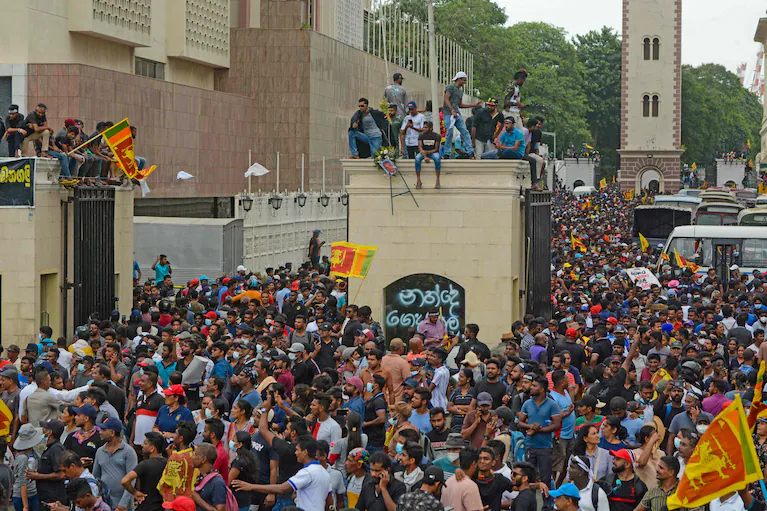Protesters demanding the resignation of Sri Lanka’s President Gotabaya Rajapaksa gather inside the compound of Sri Lanka’s Presidential Palace in Colombo on July 9. (-/AFP/Getty Images)
(Washington Post))The president of Sri Lanka agreed to step down later this month, the speaker of the country’s parliament announced, after protesters stormed the presidential home and office Saturday in a dramatic escalation of public anger over the government’s handling of a deepening economic crisis. Thousands of demonstrators descended on the presidential palace in Colombo, the capital, demanding the resignation of President Gotabaya Rajapaksa, whose family is held responsible by many for the country’s dire economic straits.
Saturday’s demonstrations were the latest in a months-long protest movement sparked by an unprecedented economic crisis in the South Asian nation. Fuel has almost run out, food prices and hunger have spiked and the country defaulted on its foreign debt repayment. The turmoil has felled the political dynasty that dominated Sri Lanka for nearly two decades.
Why are Sri Lankans protesting?
Nightly protests in the capital kicked off in April, with protesters calling for the Rajapaksas to leave politics. Some demonstrations turned violent. Gotabaya’s cabinet resigned, but Mahinda refused to step down. In early May, clashes broke out between Mahinda’s supporters and anti-government protesters at Temple Trees, the prime minister’s compound. Mahinda said he would resign, but the violence continued, and the army took hours to arrive. Mahinda was eventually evacuated.
With its national Ceylon Petroleum $700 million in debt, countries and organizations abroad have been reluctant to send fuel to Sri Lanka. Medical workers, teachers and bankers in Colombo last week protested the lack of fuel they need to provide essential services. Some Sri Lankans have boarded boats to attempt dangerous, illegal journeys to India or Australia.
How did the economic crisis get so bad?
Domestic factors, including government policies, are largely to blame. Gotabaya’s cabinet slashed taxes and resisted seeking aid from the International Monetary Fund as debt piled up. Gotabaya backed a ban on chemical fertilizers that dented crop yields as food prices skyrocketed worldwide. The coronavirus pandemic decimated Sri Lanka’s tourism industry, a key source of foreign currency.
Corruption and cronyism compounded the problem, with allegations implicating Mahinda and other members of the Rajapaksa family. In 2021, leaked financial documents included in the Pandora Papers showed that a niece of the Rajapaksa brothers had millions of dollars stashed in offshore accounts.
Global spikes in food and energy prices caused by the war in Ukraine have exacerbated the crisis. “This is the Ukraine effect,” Alan Keenan, an analyst at the International Crisis Group, told The Post in April. “A credit line for fuel you thought could last two months now lasts one. Even if you get a bailout, you’re buying less food, less fuel, less medicine.”
How have political leaders responded?
Since Wickremesinghe took over as prime minister in May, his government has resorted to desperate measures to alleviate some of the economic pain, including giving government employees a day off to grow crops in their backyards and allowing public sector workers to take five years of unpaid leave to seek jobs abroad.
The government has tried to negotiate with the IMF for a bailout, but Wickremesinghe said the effort has been complicated because the country is bankrupt. Sri Lankan authorities have sought aid from India and China, and Gotabaya called Russian President Vladimir Putin this week to ask for help with importing fuel.
But the measures have done little to alleviate the country’s economic woes, leaving many Sri Lankans unsure of how they will survive. Calls mounted for the president to resign.
“People from all walks of life have united with one intention — to demand that the corrupt president who clearly does not have a mandate, step down,” Himantha Wickremerathne, a 34-year-old lawyer who joined the protests, told The Post.
Hours after protesters seized the president’s residence on Saturday — with some jumping in the pool or cooking in the kitchen — the speaker of Sri Lanka’s parliament said Gotabaya Rajapaksa would resign from the presidency on Wednesday.
Hafeel Farisz in Colombo, Niha Masih and Gerry Shih in New Delhi and Ishaan Tharoor in Washington contributed to this report.

